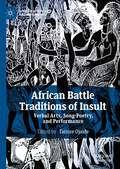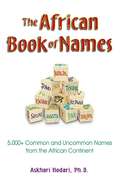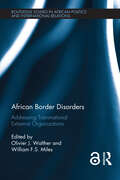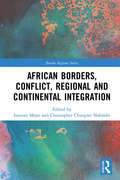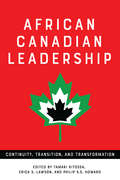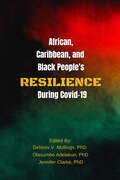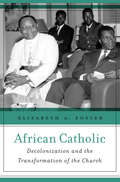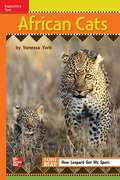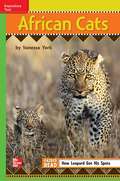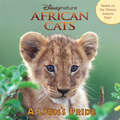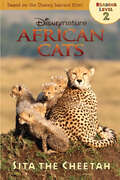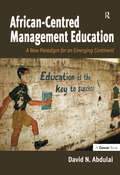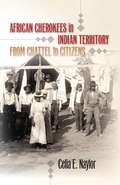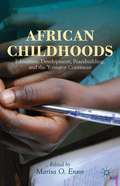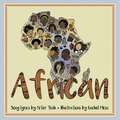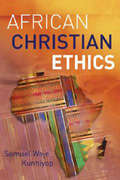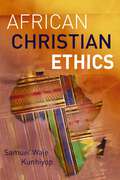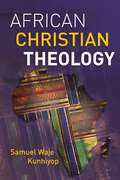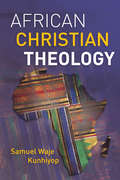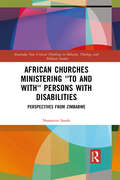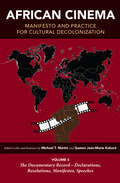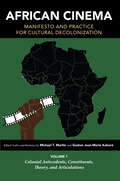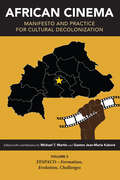- Table View
- List View
African Battle Traditions of Insult: Verbal Arts, Song-Poetry, and Performance (African Histories and Modernities)
by Tanure OjaideThis book explores the “battles” of words, songs, poetry, and performance in Africa and the African Diaspora. These are usually highly competitive, artistic contests in which rival parties duel for supremacy in poetry composition and/or its performance. This volume covers the history of this battle tradition, from its origins in Africa, especially the udje and halo of the Urhobo and Ewe respectively, to its transportation to the Americas and the Caribbean region during the Atlantic slave trade period, and its modern and contemporary manifestations as battle rap or other forms of popular music in Africa. Almost everywhere there are contemporary manifestations of the more traditional, older genres. The book is thus made up of studies of contests in which rivals duel for supremacy in verbal arts, song-poetry, and performance as they display their wit, sense of humor, and poetic expertise.
The African Book of Names: 5,000+ Common and Uncommon Names from the African Continent
by Dr. Askhari Johnson HodariFrom an author who adopted an African name as an adult comes the most inclusive book of African names. Obama, Iman, Kanye, Laila—authentic African names are appearing more often in nurseries, classrooms, and boardrooms. The African Book of Names offers readers more than 5,000 common and uncommon names organized by theme from 37 countries and at least 70 different ethnolinguistic groups. Destined to become a classic keepsake, The African Book of Names shares in-depth insight about the spiritual, social, and political importance of names from Angola to Zimbabwe. As the most far-reaching book on the subject, this timely and informative resource guide vibrates with the culture of Africa and encourages Blacks across the globe to affirm their African origins by selecting African names. In addition to thousands of names from north, south, east, central and west Africa, the book shares: A checklist of dos and don'ts to consider when choosing a name—from sound and rhythm to origin and meaning A guide to conducting your own African-centered naming ceremony A 200-year naming calendar
African Border Disorders: Addressing Transnational Extremist Organizations (Routledge Studies in African Politics and International Relations)
by William F.S. Miles Olivier J. WaltherSince the end of the Cold War, the monopoly of legitimate organized force of many African states has been eroded by a mix of rebel groups, violent extremist organizations, and self-defence militias created in response to the rise in organized violence on the continent. African Border Disorders explores the complex relationships that bind states, transnational rebels and extremist organizations, and borders on the African continent. Combining cutting edge network science with geographical analysis, the first part of the book highlights how the fluid alliances and conflicts between rebels, violent extremist organizations and states shape in large measure regional patterns of violence in Africa. The second part of the book examines the spread of Islamist violence around Lake Chad through the lens of the violent Nigerian Islamist group Boko Haram, which has evolved from a nationally-oriented militia group, to an internationally networked organization. The third part of the book explores how violent extremist organizations conceptualize state boundaries and territory and, reciprocally, how do the civil society and the state respond to the rise of transnational organizations. The book will be essential reading for all students and specialists of African politics and security studies, particularly those specializing on fragile states, sovereignty, new wars, and borders as well as governments and international organizations involved in conflict prevention and early intervention in the region.
African Borders, Conflict, Regional and Continental Integration (Border Regions Series)
by Inocent Moyo Christopher Changwe NshimbiThis book looks at the ways African borders impact war and conflict, as well as the ways continental integration could contribute towards cooperation, peace and well-being in Africa. African borders or borderlands can be a source of problems and opportunity. There is often a historical, geospatial and geopolitical architecture rooted in trajectories of war, conflict and instability, which could be transformed into those of peace, regional and continental integration and development. An example is the cross-border and regional response to the Boko Haram insurgency in West Africa. This book engages with cross-border forms of cooperation and opportunity in Africa. It considers initiatives and innovations which can be put in place or are already being employed on the ground, within the current regional and continental integration projects. Another important element is that of cross-border informality, which similarly provides a ready resource that, if properly harnessed and regulated, could unleash the development potential of African borders and borderlands. Students and scholars within Geography, International Relations and Border Studies will find this book useful. It will also benefit civil society practitioners, policymakers and activists in the NGO sector interested in issues such as migration, social cohesion, citizenship and local development.
African Calliope: A Journey to the Sudan
by Edward Coolbaugh HoaglandFollow Hoagland's travels, from equatorial mountain forests to the Sahara desert; from small Sudanese towns in the south and west to short stays in the capital, Khartoum. Hoagland's eye for detail presents the reader with electrifying images of life in the Sudan - rotten diets, disease, coups and civil war, the traders, poachers, tribal headmen, and those who come to help.
African Canadian Leadership: Continuity, Transition, and Transformation
by Tamari Kitossa Erica S. Lawson Philip S.S. HowardChallenging the myth of African Canadian leadership "in crisis," this book opens a broad vista of inquiry into the many and dynamic ways leadership practices occur in Black Canadian communities. Exploring topics including Black women’s contributions to African Canadian communities, the Black Lives Matter movement, Black LGBTQ, HIV/AIDS advocacy, motherhood and grieving, mentoring, and anti-racism, contributors appraise the complex history and contemporary reality of blackness and leadership in Canada. With Canada as a complex site of Black diasporas, contributors offer an account of multiple forms of leadership and suggest that through surveillance and disruption, practices of self-determined Black leadership are incompatible with, and threatening to, White "structures" of power in Canada. As a whole, African Canadian Leadership offers perspectives that are complex, non-aligned, and in critical conversation about class, gender, sexuality, and the politics of African Canadian communities.
The African Canadian Legal Odyssey
by Barrington WalkerThe African Canadian Legal Odyssey explores the history of African Canadians and the law from the era of slavery until the early twenty-first century. ;This collection demonstrates that the social history of Blacks in Canada has always been inextricably bound to questi52.99ons of law, and that the role of the law in shaping Black life was often ambiguous and shifted over time.Comprised of eleven engaging chapters, organized both thematically and chronologically, it includes a substantive introduction that provides a synthesis and overview of this complex history. This outstanding collection will appeal to both advanced specialists and undergraduate students and makes an important contribution to an emerging field of scholarly inquiry.
African, Caribbean and Black People’s Resilience During COVID-19
1Add to cartPrice: $39.95Page Count: 280Publication Date: November 2023ISBN: 978-1-77258-467-7The COVID-19 pandemic has made transparent the insidiousness of institutional anti-Black racism and its impact on Black people globally. Research and statistics suggest that COVID-19 disproportionately affects African, Caribbean, and Black (ACB) people. This collection provides critical discussions on the complexities of resilience in Black communities. Specifically, it highlights the resilience of ACB people, aged 12 to 85 years from Nigeria, South Africa, Jamaica, England, Canada, and the United States, by showcasing their strengths, determination, courage, contribution, leadership, innovation, creativity, cooperation, and community involvement through the sharing of reflections, essays, stories, journals, artwork, and poetry.Regardless of their country of residence, many ACB people live in societies where structural racism shapes the social determinants of health, exposing them to risk factors that impact their health, education, employment, and other needs. The authors discuss structural barriers, gender, and sexual violence, health care, education, and institutional anti-Black racism candidly demonstrating their vulnerabilities and resilience.
African Catholic: Decolonization and the Transformation of the Church
by Elizabeth A. FosterElizabeth Foster examines how French imperialists and the Africans they ruled imagined the religious future of sub-Saharan Africa in the years just before and after decolonization. The story encompasses the transition to independence, Catholic contributions to black intellectual currents, and efforts to create an authentically “African” church.
African Cats: A Lion’s Pride
by Catherine HapkaFrom the Disney Nature film, African Cats. This book introduces readers to a lioness and her cub and their life on the African plains. Filled with fun lion facts!
African Cats: Sita the Cheetah
by Disney PressInspired by the journey of the cheetahs in the Disney Nature film, African Cats: The Kingdom of Courage.
African-Centred Management Education: A New Paradigm for an Emerging Continent
by David N. AbdulaiIn African-Centred Management Education, Professor Abdulai looks critically at the failings of management education in Africa and how that has impacted growth and development efforts, especially at this critical stage in the continent’s positive growth and development trajectory. He concludes that Africa’s current positive economic growth cannot be sustained without a significant contribution from its human capital. He adds that, the outstanding economic record of Asian economies in recent decades dramatically illustrates how important human capital is to growth. These countries lacking natural resources and importing practically all their energy requirements have grown rapidly by relying on a well-trained, educated and conscientious workforce. Professor Abdulai believes that Africa, too, can sustain its current growth and development by effectively combining its abundant natural resources with its human capital to attain its economic development, but this will require an African cadre of well-trained managers at the helm of both private and public sector institutions. For this to become a reality, management education in Africa will have to play a significant role, but the author argues that it cannot be effective by continually mimicking the West in the programmes it delivers. It must come up with innovative and relevant pedagogy that will address the special challenges that the continent faces and deliver an African-centred management education. As well as pointing to the failures of management education in Africa, Abdulai offers suggestions as to how to make management education really contribute to the education of Africans, in order to sustain current and future development.
African Cherokees in Indian Territory
by Celia E. NaylorForcibly removed from their homes in the late 1830s, Cherokee, Creek, Choctaw, and Chickasaw Indians brought their African-descended slaves with them along the Trail of Tears and resettled in Indian Territory, present-day Oklahoma. Celia E. Naylor vividly charts the experiences of enslaved and free African Cherokees from the Trail of Tears to Oklahoma's entry into the Union in 1907. Carefully extracting the voices of former slaves from interviews and mining a range of sources in Oklahoma, she creates an engaging narrative of the composite lives of African Cherokees. Naylor explores how slaves connected with Indian communities not only through Indian customs--language, clothing, and food--but also through bonds of kinship.Examining this intricate and emotionally charged history, Naylor demonstrates that the "red over black" relationship was no more benign than "white over black." She presents new angles to traditional understandings of slave resistance and counters previous romanticized ideas of slavery in the Cherokee Nation. She also challenges contemporary racial and cultural conceptions of African-descended people in the United States. Naylor reveals how black Cherokee identities evolved reflecting complex notions about race, culture, "blood," kinship, and nationality. Indeed, Cherokee freedpeople's struggle for recognition and equal rights that began in the nineteenth century continues even today in Oklahoma.
African Childhoods
by Marisa O. EnsorWith 70 per cent of its people under the age of 30, Africa is the world's youngest continent. African youngsters have been largely characterized as either vulnerable victims of the frequent humanitarian crises that plague their homelands, or as violent militarized youth and 'troubled' gang members. Young people's contributions to processes of educational provision, peace building and participatory human development in Africa are often ignored. While acknowledging the profound challenges associated with growing up in an environment of uncertainty and deprivation, African Childhoods sheds light on African children's often constructive engagement with a variety of societal conditions, adverse or otherwise, and their ability to positively influence their own lives and those of others.
African: A Children's Picture Book (LyricPop)
by Peter ToshAn AALBC Recommended New Book! Included in Publishers Weekly's Children's Galleys to Grab at Winter Institute! A beautiful children's picture book featuring the lyrics of Peter Tosh's global classic celebrating children of African descent. So don't care where you come from As long as you're a black man, you're an African No mind your nationality You have got the identity of an African African is a children's book featuring lyrics by Peter Tosh and illustrations by Jamaican artist Rachel Moss. The song "African" by Peter Tosh was originally released in 1977 on his second solo record, Equal Rights. He wrote the song during a time of civil unrest in Jamaica as a reminder to all black people that they were part of the same community. The album is considered one of the most influential reggae works of all time. A key song from the classic 1970s era of reggae Peter Tosh was one of the founding members of the iconic reggae group the Wailers
African Christian Ethics
by Samuel Waje KunhiyopThis is an introduction to African Christian Ethics for Christian colleges and Bible schools. The book is divided into two parts. The first part deals with the theory of ethics, while the second discusses practical issues. The issues are grouped into the following six sections: Socio-Political Issues, Financial Issues, Marriage Issues, Sexual Issues, Medical Issues, and Religious Issues. Each section begins with a brief general introduction, followed by the chapters dealing with specific issues in that area. Each chapter begins with an introduction, discusses traditional African thinking on the issue, presents an analysis of relevant biblical material, and concludes with some recommendations. There are questions at the end of each chapter for discussion or personal reflection, often asking students to reflect on how the discussion in the chapter applies to their ministry situation.
African Christian Ethics (Hippo Ser.)
by Samuel Waje KunhiyopThis is an introduction to African Christian ethics for Christian colleges and Bible schools. The book is divided into two parts. The first part deals with the theory of ethics, while the second discusses practical issues. The issues are grouped into the following six sections: Socio-Political Issues, Financial Issues, Marriage Issues, Sexual Issues, Medical Issues, and Religious Issues. Each section begins with a brief general introduction, followed by the chapters dealing with specific issues in that area. Each chapter begins with an introduction, discusses traditional African thinking on the issue, presents an analysis of relevant biblical material, and concludes with some recommendations. There are questions at the end of each chapter for discussion or personal reflection, often asking students to reflect on how the discussion in the chapter applies to their ministry situation.
African Christian Theology (Hippo Ser.)
by Samuel Waje KunhiyopChristian theology evolves out of questions that are asked in a particular situation about how the Bible speaks to that situation. This book, African Christian Theology, is written to address questions that arise from the African context. It is intended to help students and others discover how theology affects our minds, our hearts, and our lives. As such, it speaks not only to Africans but to all who seek to understand and live out their faith in their own societies. Samuel Kunyihop understands both biblical theology and the African worldview and throws light on areas where they overlap, where they diverge, and why this matters. He explores traditional African understandings of God and how he reveals himself, the African understanding of sin and way the Bible sees sin, and how the work of Christ can be understood in African terms. The treatment of Christian living focuses on matters that are relevant to Christians in Africa and elsewhere, dealing with topics such as blessings and curses and the role of the church as a Christian community. The book concludes with a discussion of biblical thinking on death and the afterlife in which it also addresses the role traditionally ascribed to African ancestors.
African Christian Theology
by ZondervanChristian theology evolves out of questions that are asked in a particular situation about how the Bible speaks to that situation. This Zondervan ebook, African Christian Theology, is written to address questions that arise from the African context. It is intended to help students and others discover how theology affects our minds, our hearts, and our lives. As such, it speaks not only to Africans but to all who seek to understand and live out their faith in their own societies. The author understands both biblical theology and the African worldview and throws light on areas where they overlap, where they diverge, and why this matters. He explores traditional African understandings of God and how he reveals himself, the African understanding of sin and way the Bible sees sin, and how the work of Christ can be understood in African terms. The treatment of Christian living focuses on matters that are relevant to Christians in Africa and elsewhere, dealing with topics such as blessings and curses and the role of the church as a Christian community. The book concludes with a discussion of biblical thinking on death and the afterlife in which it also addresses the role traditionally ascribed to African ancestors.
African Churches Ministering 'to and with' Persons with Disabilities: Perspectives from Zimbabwe (Routledge New Critical Thinking in Religion, Theology and Biblical Studies)
by Nomatter SandeThis book engages with Christian church traditions and disability issues in Africa, focusing on Zimbabwe in particular. It critically reflects on how the church has not done much to intentionally minister ‘to and with’ persons with disabilities. In the context of this volume, ‘ministering to’ is concerned with creating worshipping space for persons with disabilities; while ‘ministering with’ is connecting and identifying with persons with disabilities to meet their needs from the material life of the church. The author considers a stewardship model of disability as an appropriate ministerial response to transform lives in poverty-stricken postcolonial contexts. The argument put forth is that the church is a living organism endowed with spiritual and material resources, and that these resources should be appropriated to marginalised stakeholders.
African Cinema: Volume 3: The Documentary Record—Declarations, Resolutions, Manifestos, Speeches (Studies in the Cinema of the Black Diaspora)
by Gaston Jean-Marie Kaboré Michael T. MartinChallenging established views and assumptions about traditions and practices of filmmaking in the African diaspora, this three-volume set offers readers a researched critique on black film. Volume Three of this landmark series on African cinema spans the past century and is devoted to the documentation of decoloniality in cultural policy in both Africa and the Black diaspora worldwide. A compendium of formal resolutions, declarations, manifestos, and programmatic statements, it chronologically maps the long history and trajectories of cultural policy in Africa and the Black Atlantic. Beginning with the 1920 declaration of the Rights of the Negro Peoples of the World, which anticipates cinema as we know it today, and the formal oppositional assertions—aspirational and practical. The first part of this work references formal statements that pertain directly to cultural policy and cinematic formations in Africa, while the next part addresses the Black diaspora. Each entry is chronologically ordered to account for when the statement was created, followed by where and in what context it was enunciated.
African Cinema: Volume 1: Colonial Antecedents, Constituents, Theory, and Articulations (Studies in the Cinema of the Black Diaspora)
by Gaston Jean-Marie Kaboré Michael T. Martin Roy Armes James E. Genova Femi Okiremuete Shaka James Burns Tom Rice Odile Goerg Med Hondo Férid Boughedir Haile Gerima Sada Niang Monique Mbeka Phoba Olivier Barlet Clyde R. Taylor Alexie Tcheuyap Esiaba Irobi Stephen A. Zacks Teshome H. Gabriel David Murphy Jude Akudinobi Maureen N. Eke Arnold Shepperson Keyan G. Tomaselli Paulin Soumanou Vieyra Boukary Sawadogo Claude Forest Samba Gadjigo Beti EllersonChallenging established views and assumptions about traditions and practices of filmmaking in the African diaspora, this three-volume set offers readers a researched critique on black film. Volume One of this landmark series on African cinema draws together foundational scholarship on its history and evolution. Beginning with the ideological project of colonial film to legitimize the economic exploitation and cultural hegemony of the African continent during imperial rule to its counter-historical formation and theorization. It comprises essays by film scholars and filmmakers alike, among them Roy Armes, Med Hondo, Fèrid Boughedir, Haile Gerima, Oliver Barlet, Teshome Gabriel, and David Murphy, including three distinct dossiers: a timeline of key dates in the history of African cinema; a comprehensive chronicle and account of the contributions by African women in cinema; and a homage and overview of Ousmane Sembène, the "Father" of African cinema.
African Cinema: Volume 2: FESPACO—Formation, Evolution, Challenges (Studies in the Cinema of the Black Diaspora)
by Ardiouma Soma Michael T. Martin Gaston Jean-Marie Kaboré Lindiwe Dovey Manthia Diawara Beti Ellerson Sambolgo Bangre Dorothee Wenner M. Africanus Aveh Mahir Saul Mbye Cham Ousmane Sembene Wole Soyinka Aboubakar Sanogo Teresa Hoefert de Turegano Claire Andrade-Watkins Olivier Barlet Rod Stoneman Férid Boughedir Claire Diao Michel Amarger Mustapha Ouedgraogo Colin Dupré Sheila Petty Imruh Bakari June Givanni Rémi AbegaChallenging established views and assumptions about traditions and practices of filmmaking in the African diaspora, this three-volume set offers readers a researched critique on black film.Volume Two of this landmark series on African cinema is devoted to the decolonizing mediation of the Pan African Film & Television Festival of Ouagadougou (FESPACO), the most important, inclusive, and consequential cinematic convocation of its kind in the world. Since its creation in 1969, FESPACO's mission is, in principle, remarkably unchanged: to unapologetically recover, chronicle, affirm, and reconstitute the representation of the African continent and its global diasporas of people, thereby enunciating in the cinematic, all manner of Pan-African identity, experience, and the futurity of the Black World. This volume features historically significant and commissioned essays, commentaries, conversations, dossiers, and programmatic statements and manifestos that mark and elaborate the key moments in the evolution of FESPACO over the span of the past five decades.
